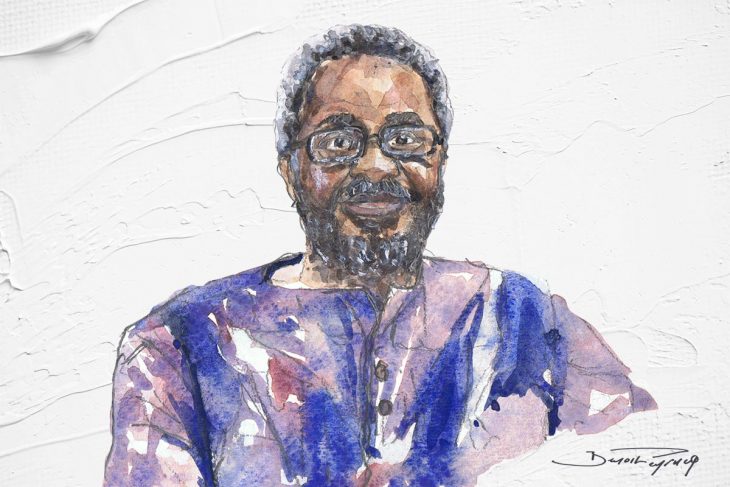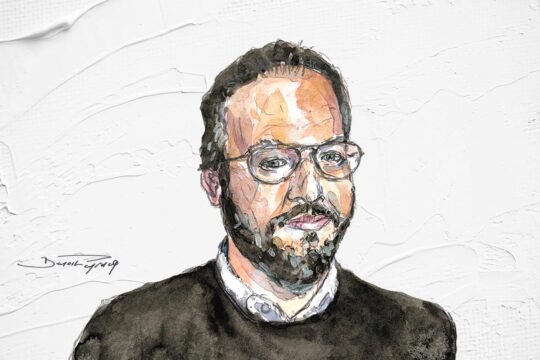JUSTICE INFO IN-DEPTH INTERVIEWS
Amzat Boukari-Yabara
Historian specialised in the African continent
French historian Amzat Boukari-Yabara, a specialist on the African continent as well as Brazil, explores the international dimension of demands for reparations related to slavery and the colonial period. In this straight-talking interview, he shines a light on how the big Western former colonial powers have responded on the thorny issue of reparations.
JUSTICE INFO: If we look at recognition and reparations for colonial crimes by the big European former colonial powers, who do you think has the worst record on reparations?
AMZAT BOUKARI-YABARA: I think France is bottom of the class – or at least it was the first to set a bad example – because it imposed a debt on a liberated country. I’m talking about Haiti. This debt imposed on Haiti at the time of its independence in 1804 is a fundamental moral and ethical issue with regard to France and reparations. In exchange for recognizing its independence, won through a war, Haiti was forced to pay France 150 million francs in compensation to the former slave-masters. This kind of vicious practice, consisting of taking back with one hand what has been given with the other, has been repeated in the context of neo-colonial policies; you are given independence and in exchange the former colonial power keeps control of your resources. This behaviour is in France’s DNA. If we take the example of Guinea Conakry, how did its independence come about? Sékou Touré said “no” to General de Gaulle and the people followed him. In reprisal, the colonial forces sabotaged everything as they left the country, making Guinea’s independence impossible because it was against the will of France. This dimension of sabotage is very particular to the French case, and today these are things that require reparations. I’ll say it straight: I think France is bottom of the class on the issue of reparations.
The United States is a different matter, a special case. Why? Because even before the abolition of slavery, free Blacks were given a territory in Africa, Liberia. At the time of abolition, there was also some vague material compensation that did not, however, erase centuries of exploitation. At the same time, there is an American tradition of legal battles, which means that the issue of reparations has targeted companies. Those whose capital was based on slavery have a strong incentive to pay up, for the sake of their image. Scholarship systems and affirmative action policies have been put in place. This can be considered a form of reparations, recognizing social and structural inequalities. But it is clear that in each case, the United States has only acted under pressure from those concerned, notably the civil rights movement, which called for social justice to counter a form of economic racism that dates back to slavery.
There’s an interesting parallel to be drawn between France and the United States, because as France is a Republic it does not recognize differences, colour: everyone is supposed to be equal, whereas in fact this is not the case, and certain groups have historically been rendered structurally inferior compared with the average. At one point, it was felt that there was a real imbalance with regard to women, so gender parity was imposed for equality and justice. But on the ethnic question, the debate is still ongoing, and it is more complicated than in the United States because there are few ethnic statistics, and they cannot be used except for certain public policies that specifically target a group of people. When it comes to trying to reduce inequalities and put in place reparative policies, it not surprisingly doesn't work.
I would add Brazil to the list of bad pupils. First, the abolition of slavery was very late, in 1888. Second, there was no policy of reparations and integration of African populations. On the contrary there was, as in the whole of Latin America, a policy of Japanese, French and European immigration to make the African populations disappear. For the past 30 years, there have been Afro-Brazilian struggles to obtain symbolic recognition, but I think France, the United States and Brazil are the main bad guys on this issue of reparations.
There has not been much in the way of reparations in Spain, Italy or Portugal. Why not include them in this list?
The case of Spain is a bit complicated because it did not itself practice the slave trade and slavery; it had it done by other countries, mainly Portugal, England and Holland. Secondly, the specificity of Spain, Italy and Portugal was their link with the Catholic Church, which was a big factor in everything these three countries did in the last six centuries. These are countries that pursued colonial policies, policies of predation, but are less developed and industrialized than France, the US or even Brazil. The latter had a system of direct trade with the African continent, without going through Portugal, which calls for a different, more local approach to the question of reparations. For example, in Benin, demands from descendants of Afro-Brazilians and Beninese are managed locally.
In the case of Italy, the reparations aspect concerns more the colonial period. When Benito Mussolini invaded Ethiopia in the 1930s to avenge Italy's defeat in 1896, he plundered the country and seized the Aksum obelisk, which Italy returned to Ethiopia in 2008. (For the record, Italy invoked all possible technical difficulties to delay the repatriation of this monument, which was done with the help of a Russian cargo ship specially equipped because of the weight of the obelisk). Libya also negotiated reparations with Italy in connection with colonization, but in exchange for helping fight immigration. We can see that Italy, Spain and Portugal are countries that, in a power struggle, can make gestures of reparation because they do not have the same power status to defend as France, the United States or the United Kingdom.
Is there a “good pupil” among the European powers?
Germany is often cited because it has a history of reparations with the Hereros and with the Jews - both of which are linked to genocides, a particularity that morally and legally requires reparations. Perhaps we can also speak of the United Kingdom, in some respects, because commissions have been created, notably in the framework of the Commonwealth, to address the issue of reparations in relation to the management of imperial history, whereas in the French case the central theme that should be reparations is rather debt, development aid, etc. One can see the difference between a liberal, positive, mercantile Anglo-Saxon vision and a conservative, chauvinistic and even denialist French vision. This is why it is interesting to compare the European powers.
Then, among the "good" students, there could be Canada. Things have been achieved symbolically with respect to the First Nations. However, mining lobbies control this issue and their interests and the stakes are different, very current, because these are still existing populations that are trying to get their culture back.
With regard to Asian countries, Japan and China have been in conflict since the Nanking massacre in 1937. This is a huge trauma and a historical dispute that still affects China's attitude towards Japan, and the issue of reparations is hot. It is currently at the heart of the diplomatic relationship between the two countries.
At the level of the Belgian State, at the political level, work still needs to be done, but the dynamics are there!"
What about Belgium?
In 2001, Belgium launched a commission on the assassination of Congolese leader Patrice Lumumba, but there were no real conclusions, since it simply recognized a kind of moral responsibility. Nothing has been done on the penal level or even on the memorial level. This year, human remains, Lumumba's tooth, will be returned to the Congo. And in 2020, it also initiated a "truth commission" on its colonial past. It is really during the last decade that groups have got active; they have done an enormous amount of work on the colonial heritage in Belgium, including the human heritage (buried people, human remains...) and this seems to me to be very interesting indeed.
At the level of the Belgian State, at the political level, work still needs to be done, but the dynamics are there! We can see that Belgians are not doing it willingly, but more and more elected officials are a product of this colonial history and take the issue of reparations to heart. In Belgium in particular, there is a need for healing, for the restoration of dignity; most of the people concerned are Belgians of African origin, but they claim something for their country of origin while wishing to remain Belgian! It is interesting, because there is a real altruistic side. This dynamic can also be found to some extent in France.
Nevertheless, we will have to learn lessons from the way in which the restitution of Lumumba's tooth is carried out, as the Belgian authorities do not wish to assume their responsibilities and the Congolese authorities are no more committed, despite the establishment of a protocol.
How do you explain that no official request for reparations seems to have come from Somalia or Eritrea, former Italian colonies, or from Guinea Bissau and Angola, former Portuguese colonies?
The former Portuguese colonies gained their independence through war, so I think they are in a different relationship than territories that were just decolonized. For Guinea-Bissau and Cape Verde, no particular request for reparations has been made to Lisbon, but in reality, the Portuguese colonies subcontracted to England or to South Africa. So money from the slave trade, slave economy and colonial economy of Portugal ended up in the accounts of British banks. The demands that could be made could therefore be aimed at specific companies and sectors.
As for Somalia, it has not asked for reparations because it simply has other problems. It is a country in a very complicated situation, with a fragmented territory.
Benin is a model in the way it seeks to make history a tool of national pride, sometimes with contradictions"
In Africa is Benin, which was a Portuguese and then French colony, a model in terms of demands for reparations, some of which have been successful?
I think Benin is a country where there is a tradition of conciliation, dialogue, and peace, and the question of reparation goes hand in hand with this. Kingdoms still exist there and there are still very strong cults and traditions. All of this necessarily calls for a return [of looted works] and even for a continuity of historical memory. For me, Benin is a model in the way it seeks to make history a tool of national pride, sometimes with contradictions, in particular the important role of civil society, internal political agendas and interests that go beyond repairing memory of the past. There are undeniable financial and economic interests that are linked to tourism for the country, for which it wants to sell a good image. Take the example of the museums that are being built in the country for the restitution of works of art: it is symbolic for many people, it touches them, and they will be happy to have a looted cultural heritage returned to them. But to put it very clearly, the construction of museums is also part of an economic tourism project for public and private Franco-Beninese interests. And the real question that arises from this is what will accompany these constructions: what educational policy, what showcase for these works, and especially what financing? Given the state of the cultural budget in Africa, this will be financed either by the private sector or by foreign donors.
You just have to look at the Afro-descendant youth in France, they are ‘insurrectional’ because their history has never been taken into account."
More generally, in your opinion what is at stake in the current demands for reparations for colonial crimes in France?
For me, these are simply issues of democracy. I think that when you live in a country, whether you are French or not, you are part of the life of that country and its people. The question of reparations means giving back to all those who are "invisible" because of their foreign origin or their social status, their share of existence, dignity, recognition and their share of memory. This work, which is democratic, is similar to the work on the teaching of French history. We cannot teach the history of a country that is the second largest maritime power in the world in isolation. There are also questions of values, especially for a country that claims to be a country of human rights and that is not capable of institutionalizing the principle of repair. This raises questions because the principle of reparations says that once you know what you have repaired, you understand its fair value and you will not break it again. The fact that there are no reparations implies that you might do it again.
In this process of reparations, there is also offering apologies. However, we have a political class that uses the term "repentance" as if we were waiting for the confession of a sin, whereas the populations concerned expect to receive concrete reparations, and also a real apology. This is the impasse of the Taubira Law [a 2001 law recognizing the slave trade and slavery as a crime against humanity]: it is attacked for promoting repentance, but it does not address reparations. It is true that it puts France as the first country to recognize slavery as a crime against humanity, but it does not impose anything binding. In my opinion, it is a problem of institutionalizating reparations. In the US and UK, research centres have been working on these issues for a long time. In France, it is more recent, with the Repairs project, which has just published a database making it possible to trace reparations - paid to slave owners - at the time of the abolition of slavery.
Finally, another thing that explains why all this is a process that takes time is that a policy of reparation allows for the completion of mourning. In the so-called Afro-descendant populations, there is a lot of trauma, and reparations would allow for this mourning to be completed. You just have to look at the Afro-descendant youth in France, they are "insurrectional" because their history has never been taken into account.

Amzat Boukari-Yabara, whose father is from Benin and whose mother is from Martinique, holds a Paris doctorate in African history and civilizations (Ecole des Hautes études en Sciences sociales) and a degree in social sciences and Latin American studies (Institut des hautes études de l’Amérique latine). He is the author of several books: "Nigeria" (De Boeck, 2013), "Mali" (De Boeck, 2014), "Africa Unite! A History of Pan-Africanism" (La Découverte, 2014) and "Walter Rodney, itinéraire et mémoire d'un intellectuel africain" (Présence africaine, 2018).








